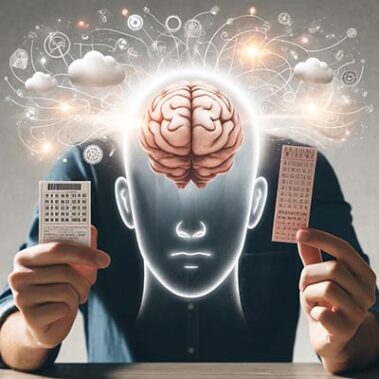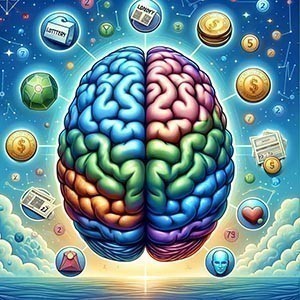
At the core of our society lies the endless pursuit of happiness and fulfillment, a quest that often leads us down paths lined with hope and sweetened by the promise of quick riches. Playing the lottery, a practice as old as time itself, embodies this dream par excellence. But what drives millions of people around the world to pick their lucky numbers week after week, hoping to hit the jackpot? “Why Do We Play the Lottery? A Psychological Perspective” delves deep into the human psyche to explore the motivations and hopes that prompt us to reach for that lottery ticket.
Playing the lottery is a fascinating facet of human behavior, driven both by the sheer improbability of a jackpot win and the irresistible allure of ‘what if’. This practice, which spans various cultures and epochs, has become a firm part of social and cultural life in modern society. The introduction of online lottery has only made this tradition more accessible, enhancing the global enthusiasm for this form of gambling.
Here you can play Eurojackpot and EuroMillions online.
The Psychology of Lottery Playing
At the heart of lottery playing is hope—a powerful psychological phenomenon that motivates and drives us. This hope is not just a dream of financial security, but also the desire for a new life, free from the worries and constraints of everyday life. The optimism that ‘this time it could be me’ is a powerful driving force that consistently binds lottery players to the lottery, despite statistically minimal chances of winning.
The Concept of Hope in Lottery
Hope in the context of lottery playing is double-edged. On one hand, it inspires dreams and keeps the fire of possibility burning. On the other, it can lead to an endless loop of disappointments. However, it is this first aspect—the positive, forward-driving force of hope—that justifies many for their repeated participation.
The Influence of Optimism
Optimism plays a central role in the lottery. It allows players to overlook the real probabilities and focus instead on the potential happiness that a win could bring. This optimistic attitude is often fueled by stories of lottery winners, who keep the dream alive that anyone can win.
Why People Play Despite Low Odds of Winning
The decision to play the lottery often contradicts logical thinking and rational decision-making. This paradox can be explained by a series of psychological biases and socio-cultural factors.
The Role of Biases and Illusions
Cognitive biases such as over-optimism and the illusion of control lead people to believe they have better chances of winning than statistics would suggest. Many players overestimate their ability to influence the outcome by choosing certain numbers or following rituals.
Social and Cultural Factors
Social influences can also play a role. Participating in lottery pools at the workplace or within communities strengthens the sense of belonging and increases the fun factor of playing. Cultural narratives that emphasize the value of ‘challenging oneself’ and ‘trying one’s luck’ also contribute to making lottery playing an attractive option.
The Dream of Quick Wealth
The pursuit of quick wealth is a deeply rooted human longing that makes lottery playing particularly enticing. The opportunity to win large sums with a small stake appeals to the universal fantasy of leaving financial worries behind overnight.
Influence of Media and Success Stories
Media reports on lottery winners play a crucial role in keeping the dream of quick wealth alive. These stories are often cited as evidence that anyone has the chance to change their life through the lottery.
The Desire for Life Change
Many lottery players are driven by the desire to fundamentally change their lives. The potential win is seen as a ticket to a new life—a life that offers freedom from financial constraints and the opportunity to realize dreams.
Risk-Taking and Decision Making
 At the heart of the lottery game lies a fascinating paradox: the willingness to take a risk despite minimal chances of winning. This aspect of human behavior provides deep insight into our decision-making processes, especially regarding risk and reward.
At the heart of the lottery game lies a fascinating paradox: the willingness to take a risk despite minimal chances of winning. This aspect of human behavior provides deep insight into our decision-making processes, especially regarding risk and reward.
Risk vs. Reward: A Psychological Perspective
The decision to play the lottery is a classic example of weighing risk against reward. Despite a clear understanding that the likelihood of winning is extremely low, millions of people around the world decide each week to try their luck again. This decision is heavily influenced by the hope of a reward so life-changing that it overshadows the small risk involved. Psychologically, people tend to value the potential gain higher than the likely loss, a phenomenon known as ‘loss aversion’.
The Illusion of Control Another psychological factor at play in lottery playing is the illusion of control—the belief that one can influence the outcome through certain actions. Many players choose their numbers based on birthdays, anniversaries, or other personal significant numbers. These practices reinforce the belief in control over an otherwise random event. The illusion of control can be so strong that it continues to drive players’ behavior despite repeated losses.
Social Aspects of Lottery Playing
Lottery playing is not just an individual endeavor; it also has significant social components that explain its attractiveness and enduring popularity.
Community and Participation
For many people, lottery playing is a social activity that they share with friends, family, or colleagues. Participating in lottery pools or syndicates not only increases the chances of winning by purchasing multiple tickets but also fosters a sense of community and belonging. These social interactions can enrich the lottery-playing experience and add an extra dimension of enjoyment and sharing of hopes.
The Influence of Family and Friends
The decision to play the lottery is often influenced by family members or friends. Stories of close acquaintances who have won, or the shared tradition of gifting lottery tickets on certain holidays, can contribute to people’s positive attitude towards the game. These social influences enhance the attractiveness of lottery playing and are an essential part of its continued popularity.
The world of lottery playing is a fascinating mix of hope, dream, and strategy, embedded in a practice deeply rooted in human culture. While the chance of a major win remains the main attraction, it is the complex psychological, social, and cultural aspects that make lottery playing a lasting and universal phenomenon. The transition to online lottery has only made this experience more accessible and diverse, leading the fascination with the game into new dimensions. In this sense, lottery playing remains a reflection of human hopes, dreams, and the relentless faith in the chance that next time, luck might be on our side.
Online Lottery: A New Era of Playing
The digital revolution has fundamentally changed the way we play the lottery. With the rise of online lottery, accessibility and convenience of the game have significantly improved, leading to an expansion of its popularity. This development reflects not only the change in our interaction with technology but also opens new perspectives on the psychological aspects of lottery playing.
The Rise of Online Lottery
Online lottery has significantly lowered the barriers to participation in lottery games. Players can now place their bets from anywhere and at any time, without the need to visit a physical outlet. This convenience has particularly attracted a younger generation of players who have grown up with digital technologies and are accustomed to using services online. The simplicity and accessibility of online play have contributed to making lottery playing even more popular among the masses.
Security and Convenience of Online Playing
In addition to convenience, online lottery platforms also offer enhanced security measures. Digital lottery tickets do not get lost, wins are automatically checked, and smaller prize amounts are directly transferred to players’ accounts. These security aspects help to strengthen players’ trust in online play and minimize concerns about fraud or loss. Moreover, the platforms allow players to monitor and control their gaming behavior, promoting more conscious and responsible play.
Strategies and Superstitions in Lottery
Lottery playing is rich in traditions, strategies, and superstitions developed by players to enhance their chances of winning or simply to increase their enjoyment of the game. These practices provide a fascinating insight into human nature and how we deal with the concept of chance.
Popular Strategies and Their Psychological Significance
Some players follow specific strategies or patterns in selecting their numbers, such as using statistics to identify “hot” or “cold” numbers. Others rely on personally significant dates like birthdays or anniversaries. These strategies convey a sense of control over a random event and reinforce the illusion that one can influence the outcome. Although these methods do not statistically improve winning chances, they contribute to deeper engagement with the game and enhance the personal experience.
Superstition and Ritual in Lottery
Superstition plays a non-negligible role in lottery playing. Many players perform rituals or adhere to specific habits when purchasing their lottery tickets or choosing their numbers. These rituals can range from simple actions like wearing a lucky charm to complex sequences before buying a lottery ticket. Although these practices have no impact on the outcome of the game, they are an integral part of the lottery experience for many players and contribute to its appeal.
The world of lottery playing is a fascinating mix of hope, dream, and strategy, embedded in a practice deeply rooted in human culture. While the chance of a major win remains the main attraction, it is the psychological, social, and cultural aspects that make lottery playing a lasting and universal phenomenon. The transition to online lottery has made this experience even more accessible and diverse, leading the fascination with the game into new dimensions. In this sense, lottery playing remains a reflection of human hopes, dreams, and the relentless belief in the chance that next time, luck might be on our side.



